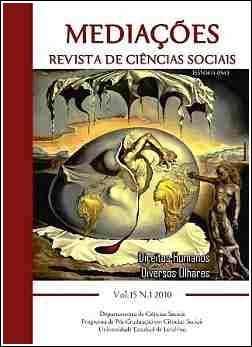Between the analytical and the prescriptive: disputes about human rights
DOI:
https://doi.org/10.5433/2176-6665.2010v15n1p30Keywords:
Human rights, Political theory, Analysis, PrescriptionAbstract
The theme of human rights is considered a relevant and spread field of research. Many scholars of the most varied currents of thought and political affiliations have been working on the subject with great passion – not without reason. This movement is exactly what has hindered the lay reader to distinguish, in the debate about human rights, analytical arguments of more purposeful approaches. The aim of this paper is to show those who are introducing in this topic of research, at least two different levels in which the literature of area addresses the issue of human rights. We also use two examples for the treatment of the phenomenon: on one hand, an explanation of analytical-descriptive nature, and on the other hand, a more prescriptive-normative approach. The aim of this course is to enable students to understand the different functions of one and other type of handling of the theoretical-conceptual tools of the area.Downloads
References
ARENDT, Hannah. Origens do Totalitarismo. São Paulo: Companhia das Letras, 1989.
AUDARD, Catherine. Cidadão. In: CANTO-SPERBER, M. (org.). Dicionário de Ética e Filosofia moral. São Leopoldo: Ed. Unisinos. 2003. v. 1.
BARTELSON, Jens. A genealogy of sovereignty. Cambridge: CUP, 1995.
BENHABIB, Seyla. The claims of culture. Princeton: Princeton University Press, 2002.
BENHABIB, Seyla. The rights of others. Cambridge: CUP, 2004.
BODIN, Jean. Les six livres de la Republique. Paris: Fayard. 1986. v. 1.
BENHABIB, Seyla. On sovereignty. Ed. by Julian H. Franklin. Cambridge: CUP, 1994.
BROWN, Chris. Universal human rights: a critique. In: DUNNE, Tim; WHEELER, Nicholas J. Human rights in global politics. Cambridge: Cambridge Press, 1999.
COSTA, Sergio. Dois Atlânticos: teoria social, anti-racismo, cosmopolitismo. Ed. UFMG: Minas Gerais, 2006.
DONNELLY, Jack. International Human Rights. 2nd Edition. Boulder Co: Westview Press, 1998.
FORSYTHE, David P. Human rights in international relations. Cambridge: CUP, 2006.
GOYARD-FABRE, Simone. Princípios filosóficos do direito político moderno. São Paulo: Martins Fontes, 2002.
FUKUYAMA, Francis. O fim da história e o último homem. Rio de Janeiro: Rocco, 1992.
HABERMAS, Jürgen. A constelação pós-nacional. São Paulo: Littera Mundi, 2001a.
HABERMAS, Jürgen. Zeit der Übergänge. [Era das transições]. Frankfurt: Suhrkamp, 2001b.
HABERMAS, Jürgen. A inclusão do outro. São Paulo: Loyola, 2004.
HABERMAS, Jürgen. Die Einbeziehung des Anderen. [A inclusão do outro]. Frankfurt: Suhrkamp, 1997.
HABERMAS, Jürgen. Sobre a legitimação pelos direitos humanos. In: MERLE, Jean-Christophe; MOREIRA, Luiz (org). Direito e legitimidade. São Paulo: Landy Editora, 2003.
HELD, David. Democracia, o Estado-Nação e o sistema global. Lua Nova, São Paulo, n. 23, p. 149-94, 1991.
HELD, David. Democracy and the global order: from the modern state to cosmopolitan governance. New York: Stanford Press, 1995.
HELD, David. Political theory and the modern state. California: Stanford University Press, 1989.
HOBBES, Thomas. Leviathan. Edited by C. B. MacPherson. London: Penguin Books, 1988.
HUNTINGTON, Samuel P. Choque de civilizações. São Paulo: Objetiva, 1997.
IGNATIEFF, Michael. Human Rights as politics and idolatry. New Jersey: Princeton University Press, 2001.
KANT, Immanuel. Zum ewigen Frieden. Sttutgart: Reclam, 1991.
KELSEN, Hans. Teoria geral do direito e do Estado. São Paulo: Martins Fontes, 1990.
KOERNER, Andrei. Ordem política e sujeito de direito no debate sobre direitos humanos. Lua Nova, São Paulo, n. 57, p. 87-111, 2002.
KRASNER, Stephen D. Sovereignty – organized hiprocrisy. New Jersey: Princeton University Press, 1999.
KRITSCH, Raquel. Soberania: a construção de um conceito. São Paulo: Humanitas, 2002.
KRITSCH, Raquel. Política e direito: da dupla natureza da noção de soberania. Revista Brasileira de Direito Constitucional, São Paulo, v. 6, p. 375-99, 2005.
PICO DELLA MIRANDOLA, Giovanni. Oratio de hominis dignitate. Tradução Eugenio Garin. Firenze: Vallechi, 1942.
RITTBERGER, Volker. (ed.). Regime Theory and International Relations. Oxford: Clarendon Press, 1993.
STRAYER, Joseph. As origens medievais do Estado moderno. Lisboa, Gradiva, sem data.
WALZER, Michael. Esferas de justiça. São Paulo: Martins Fontes, 2003.
WEBER, Max. Ciência e política: duas vocações. São Paulo: Cultrix, 1996.
WEBER, Max. Wirtschaft und Gesellschaft. [Economia e sociedade]. Tübingen: Mohr, 1980.
WEBER, Stefan (org.). Theorien der Medien: Von der Kulturkritik bis zum Konstruktivismus. Konstanz: UVK, 2003.
Downloads
Published
How to Cite
Issue
Section
License
Copyright on articles published in Mediações belongs to the author(s): in the case of partial or entire republication of the original publication, we ask author(s) to indicate the original publication in the periodical.
Mediações uses the Creative Commons Attribution 4.0 International license, which allows Open Access, enabling any user to read, download, copy and disseminate its content so long as adequately referenced.
The opinions expressed by the author(s) are their sole responsibility.
































